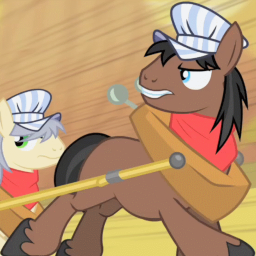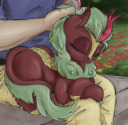
Promontory
Changes
Admiral Biscuit
He was born on a small cherry orchard, improbably sited on the edge of the desert. Everypony agreed that it was a terrible place to plant an orchard. The soil was too sandy and too dry for anything to thrive. Even the cacti struggled there. It mattered not one whit to his parents; they believed that a pony could do anything she set her mind to. They built their first house out of sun-dried mud, and it was there he was born. His parents—as was the tradition back then—called him ‘son.’ One day, he would earn his cutie mark, and then they would see what he was meant to be. Until then, he would enjoy the innocence of foalhood.
Of course, there is no respite on a farm. As soon as he was old enough, he was put in harness, tugging the plow across the fields from dawn till dusk. He didn't like it, but he did it, because if he did not there would be no food to eat.
Sisters came as regular as clockwork, each born within a week of the other. The first was called “Jubilee,” the second “Berry.” They, too, worked the farm as soon as they were able, bucking trees and weeding the miserly garden. They settled into their lives, but he did not. Every night when he was done working, he would seat himself upon a great prominence of rock that jutted out from the desert floor, watching the land. The desert stretched forth like a great sea, and he wanted nothing more than to explore it.
The cherry orchard grew and thrived. Whether it was his mother’s special talent or the irrigation ditches his father dug was immaterial; soon enough other ponies began to move in, too. They came in families, towing their Conestoga wagons. Equestria was expanding, testing her borders. It was a fine time to be alive.
Soon enough, Cloudsdale was sending regular rainstorms. The land blossomed and the orchard grew. He pulled the plow. He pulled the wagon to market. And he rested on his rock, taking comfort in the sun-warmed sandstone giving off its heat as the sun descended below the horizon. It was there that he finally got his cutie mark.
One day, he was in town and a stagecoach arrived. He had never seen such a thing before. It was a high-wheeled contraption, built of gleaming wood. He looked back at the wagon he towed with a guilty expression. This new thing was the pinnacle of pony technology, he was sure. He followed it all the way to the center of the town, galloping to keep up.
He dared not approach it too closely, so he watched from a block away as the passengers disembarked, and the team went for beans. He would have loved to stay longer, but he needed to get back to the orchard before sundown.
After that day, he hurried to finish his chores so that he could sit upon his rock and watch the coach move across the desert. His family’s fields held no love for him, and when his younger brother became strong enough to tow the plow, he left the farm with his few belongs tucked safely in his hand-me-down saddlebags.
He stood patiently at the small depot. It was not his first visit there; whenever time permitted he haunted the rough wooden sidewalk or pressed the stationmaster for information. She was a kindly old mare, and more than willing to bend his ear with tales. She’d provided him with countless details about the company and—his most treasured possession—an old timetable of all the southern routes. Even now it was seated snugly in his saddlebags, the pages worn from hours of study. He'd taught himself to read the names of the towns where the coaches went.
The arrival of the stage always had a ritualistic feel to it, and this time was no different. The team galloped across the hardpan, only slowing when they reached the first cluster of buildings. The wheel team slowed the wagon, while the lead team matched their pace. He could tell whenever there was a replacement pony in the traces: the harness lines would jerk as the wagon slowed, and the veterans would shake their heads in dismay. Not this time. No words were exchanged, yet the team kept up a smooth pace, proudly stopping the coach exactly in line with the station door.
The stationmaster had a stepping-stool ready, and set it at the foot of the door. Three ponies stepped out—a bored-looking stallion, a wary mare, and a filly with an excited look in her eyes. She began speaking even before setting hoof on the stool, but he paid her no mind. He watched instead as the luggage compartment was opened. Their possessions were stacked neatly, and then the vitally important mail sack was removed and another was put in its place.
As the stationmaster and postmaster worked, the team unfastened themselves from the shafts and eveners. All four trotted off together to the base of the town’s water tower, where a public hose was neatly coiled. They took turns rinsing the sweat off themselves, with never a wasted motion. This was a place where the pegasi rarely brought rainclouds; water was hard-won and hoarded. Yet, nopony begrudged them their refreshment, for it was they who brought the mail and craftworks.
Their shower was quick and efficient, like all their movements. There was far less tomfoolery than when he bathed with his brothers and sisters. Once they'd all had their turn and shaken themselves off, they trotted across the street to the tavern for a quick dinner.
Somepony else in his situation might have been impatient, but he was not. He walked around the coach, examining its every detail. It was lovingly built and lovingly maintained. It showed signs of age—there were grease-stains around the hubs that could never be cleaned off, and the pivots in the harnesses were slightly oblong. On the left door, mismatched enamel showed where a hinge had been replaced, and the hatch to the baggage compartment closed slightly askew. A thin film of dust covered the whole coach, all except the bright wheel treads, which were constantly polished by the hard desert floor.
He’d examined the stage from every possible angle when they returned from their quick dinner. The lead stallion—a towering mountain of horseflesh—nodded at him.
“I’d like to go to Canterlot,” he said, holding a small bag of bits out.
The stallion looked at him thoughtfully. He trembled under the scrutiny: it was a wonder he’d spoken without stuttering. Finally satisfied, the stallion took the bits, carefully counting them out. “All right. Stopover in Appleoosa. You c’n stay in the hostel, or if you’ve enough bits, at the hotel. Coach’ll leave at ten a.m. sharp.” He looked back to where his team was fastening their harnesses. “You c’n ride atop, if you want.”
He looked at the broad seat across the front of the wagon. It was rarely used; occasionally a guard would ride there, keeping an eye out for distant threats. He’d heard some pegasi preferred that seat, too: many of them detested being indoors. Not that he’d ever seen one up close; Dodge Junction was an earth pony enclave and the pegasi stayed in the sky where they belonged.
He nodded eagerly, and the stallion boosted him up. “What’s your name, son?”
“Promontory,” He pointed a hoof off to a distant rock, aglow in the setting sun. “I was named after that rock.”
“It’s good to be named after the land,” the stallion said. He walked forward and slipped into his position, yanking the straps tight with his teeth. The other three were stepping in place, ready to do their duty.
With a simple nod from the lead stallion, the four began pulling. He alternated between watching them work, and watching the world he’d known disappear in the trail of dust behind the stage.
The coach arrived in Canterlot as the sun was setting the next day. His first destination was not the castle, nor the gardens which surrounded it. The museums and plays were of no interest to him; instead, he walked down the platform and across the street to a nondescript clapboard building.
He boldly waltzed in, opening the most ornate door in the place. A balding grey pony looked up in surprise.
“I want to pull a coach,” he said. He’d rehearsed the line for weeks, and he’d never considered what he would do if he wasn’t hired.
“You do, huh?” The stallion pushed his glasses down to get a better look at Promontory. “Well, you’ve got the build for it.” He shifted around some papers on his desk. “All right. I’ll hire you, but you won’t start out pulling a coach. You’re gonna start out hauling delivery wagons around Canterlot. Can you do that without screwing up too bad?”
“Yessir.”
“Five a.m.,” he said simply. “You can stay in the company hostel. There’s a group room on the top floor. Might have to share a bed. Is that gonna be a problem?”
He thought back to his home. He’d never had a bed of his own. It might be a little weird sleeping with a stranger, but he supposed if that was what it took to achieve his goal, he would do it and he would not complain. “No, sir. Not a problem.”
“Good.” The grey stallion looked back down at his desk, the conversation finished.
He nervously stepped up the stairs to his new home. On the main floor, there was a small dining room and kitchen; on the other end, the senior teams had their rooms. The next floor up was crowded with regular deliveryponies, while the third floor was open. Beds were scattered haphazardly around the room, some occupied, some not. He thought about claiming one for himself, but did not. He went to a corner and curled up, watching the ebb and flow of ponies who came and went. He dozed off a few times, but the excitement of a new job and meeting new ponies mostly kept him awake.
The next few years flew by in a blur. He graduated from a local delivery team to a long-distance delivery route. He took the jobs nopony else wanted, ranging as far afield as Baltimare and Ponyville. Sometimes he pulled alone; other times he was part of a team. He was friendly to everypony, and pressed the old heads for every bit of advice he could get.
He spent a year behind coaches on the tricky mountain roads that descended from Canterlot. He was tied to the back of the coach to provide additional braking. It was hardly a glamorous job, but it was an indication of their trust in his abilities. If he failed, the coach, its passengers, and the team would all be yanked over the edge. It was a sobering thought.
Another year passed; spring to summer to fall to winter, just as always. Regular as clockwork, and regular as his route. He’d learned the trouble spots on the roads, and he’d learned the seasons’ particular challenges. Spring meant mud, and mud meant wagons got stuck. Thawing ground pushed up cobblestones. Summer meant heat, and he had to be careful not to overwork himself. Hosing himself off at the end of a run was more than a luxury, it was a survival technique. Once upon a time, when he was but a foal, he hated getting his coat wet, but no more. Fall was unpredictable, and wet leaves were as slick as ice underhoof. Winter was the most challenging season of all, because the roads were sloppy and snow hid obstacles, but the crystal-clear nights and sharp scents made it all worthwhile.
The next spring he finally got promoted to lead on a coach route. He began as the left-front pony—responsible for calling the starts and stops of the coach—but as the seasons changed, so did his position. He was promoted to right-front, and when the senior-most stallion retired, right-rear. His new position was the cause for weeks of ribbing and good-natured jibes, most of them centered around the fact that’s he’d spend all of his time staring at John Bull’s tail. He took it in stride; it was the second-most superior position. Here he was responsible for half the braking, as well as keeping stride and course with the lead team. It seemed the less-glorious position to those who were not in harness, but to him it was a mark of how much they trusted him.
The only burr under his harness was a new competitor: the iron team. He’d seen one in Baltimare, and hadn’t been impressed. It made hissing noises all the time that were grating to his ears. The whole thing reeked of hot metal and smoke—which it belched forth in quantities rivaling a dragon. It couldn’t keep pace with a team of ponies, it couldn’t travel where a road had not been laid for it, and he’d even heard that if it ran out of water it would explode. Such a thing was clearly impractical . . . yet as the months turned into years, he found himself running alongside more and more of its paths. He would watch it lumber up the mountain with a train of coaches in tow, and he often debated whether he should cheer it on or wish for it to break.
He and his fellows even had to haul one—complete with its train—all the way to Appleoosa after it broke. Worse, they got attacked by buffalo on their way. Promontory cursed the thing as he knocked a buffalo away from the tracks—had they been towing a proper coach, they could have avoided the tribe entirely, but this thing was trapped by its rails, and so was he.
Many seasons pass. There’s a new pony at the head of the company, and she’s merciless. She sees the writing on the wall: the tracks now extend to every Equestrian settlement. With no respect for tradition, she closes the hostels and way stations, putting hundreds of ponies out of jobs. Local deliveries boom, but there’s an axe hanging over the heads of the stagecoach teams. Everypony knows they’re hemorrhaging red ink, and it’s only the mail contracts that are keeping them afloat—and every year the iron team is faster and more reliable. One by one the coaches are being replaced by simpler, smaller wagons that a team of two can manage. They have an open bench on top, thus fulfilling the requirement that they provide passenger service, but nopony uses it. The train is faster and cheaper. True, it belches foul smoke, but that’s a small price to pay for progress.
His team huddles around a table in the tavern across the street from the Canterlot station. They know it’s only a matter of time before they’re broken up. John Bull has a brother who repairs wagons; he has a damaged coach that he can repair and sell them cheap. They agree to pool their meager savings and buy it. Their only hope is to run an express route between Dodge Junction and Appleoosa—the train tracks don’t run between the towns directly, and there’s little traffic, but maybe—maybe—just enough for them to make a go of it.
He sighs, his glass of beer mostly untouched. Through the flyblown windows of the tavern he can see the old hostel. It’s a warehouse now; the gilt sign above the door is long gone and the once-proud limed plaster is chipping and faded. The formerly vibrant dining room is now stacked with crates, the kitchen has become a bathroom, and the coach team’s rooms are now offices. His head seems heavier at the thought.
He finishes his beer in one long swallow, and heads out the door.
























Bravo. Real world themes aren't too prevalent in fanfiction, but you've managed to do it seamlessly. It fits well into the universe and it's got a great theme. There's nothing not to like.
Very nicely done.
He's doesn't even have a mark yet. But besides something out of your power, well done.
This was good, mate. sorta feel sad for that pone .
5080101 * pone .
5079794
Thanks!
5079962
Also thanks!
5080066
Yeah, that was kind of out of my control. There really isn't much fanart of Promontory.
5080101
Seems like it would be difficult to have a special talent which was no longer relevant.
5080394 Obviously, you must not know that "pone" is an internet alternative to "pony". I just like to use it.
5080419 your life's destiny no longer needed. must be a terrible experience. Well, they could use their talents other places. I hope.
This is seriously awesome. I will point out that, as long as the rail net isn't completely inclusive, there will be room for stage coaches. Promontory's job won't be completely phased out until the invention of the motorcar.
5080526
That's very true, but as the railroad extends to more and more towns, his job will become less and less important, and the whole nature of the stagecoach business will change.
Pic not related:
5080568
Sadly, yes. Though he may well retire before the process completes itself. The process could take a very long time to complete itself, especially because Equestria is still expanding.
Or he may go into a related field of work -- perhaps he'll become a truck driver.
5080498 1337 cypher dycription is not known by all.
Aw man. The ending makes me feel bad.
We could have been rid of the coal industry a decade ago but for the bullshit excuse that it would put people out of work. Fucking lobbyists and their pet politicians.
"It's the only trade I know" is never an excuse. If you can't go to the trouble of learning something new to keep yourself useful, you're not even trying to stay employed. Specialization is for insects.
5085048
You're preaching to the choir, my man. I work as a mechanic, and I grit my teeth every time someone laments the passing of carburetors and points. I go to training classes every month to learn about new technologies, and our shop is investing in tools to program onboard computers and to repair hybrids, because those things aren't going away, as much as some wish they would. I've learned DoS 2.0, Windows 3.1, 95, XP, Vista, 7, and 8. Gone from rotary phones to smart phones.
Life moves on, and--to quote The Shawshank Redemption--you either get busy living, or get busy dying.
5085325
To be fair, I despise newfangled automatic transmissions and I'd sooner take a bike everywhere than give up my clutch and shifter. But then, science and technology marching on implies the old is inferior to the new, which sure as hell aint the case with transmissions. Stick shifts give extra fine control over torque and traction that no computer can provide and can literally save your life here in the cold north.
Also, as far as operating systems go, 30 year old unix-like computing is anything but inferior. Even Microsoft is grudgingly acknowledging it with Windows 10 by finally adding long-overdue linux shell-like features to the command prompt.
edit. By any chance, can you guys purge a car's onboard computer and stick linux on? Or maybe have it tell the
American STASINSA that it's in Timbuktu?5085384
In some cases, yes, if you know how to use them right. I could manipulate the manual trans on my old 88 S-10 well enough to get through weather that was putting the idiots with 4x4 and no skills into the ditch . . . on the other hand, I test drove a Caddy CTS-V in weather that would be best described as a slip-n-slide, and I couldn't make it break loose no matter what I did. The computer knew what all 4 wheels were doing, and managed them down to the millisecond.
That's beyond what our capabilities are (but of course it's theoretically possible). However, I have a friend who's a semi-pro rock-crawler, and he and one of his friends built an OS for his four-wheeler that was adjustable on the fly via radio.
And now I am sadface. Progress is progress, though, and he did have a successful career while it lasted.
I hope there's a squeal, maybe he ends up having to work on a train, or maybe he stays with coaches, because no matter how advanced people get there's always room for retro stuff.
Hell, there's still a lot of areas in the UK (where I live) that still run steam trains because they love em!
What a nice little read. Progress does have its challenges, especially for those that find themselves in an area that's in decline. The need will still be there but it won't be the same as it used to be.
On a side note, I had the theme from Shining Time Station playing in my head while I was reading this. Ah, nostalgia.
Faved and thumbed, also extra oldguy points for use of the word oblong.
I don't trust these modern kids with their new-fangled rectangles.
6974090
oblong is a great word.
Bit of a sad ending, but an excellent story (and a quality sort of sad in the ending, if that makes sense), with many of the lovely details you seem to like putting in. :)
(And I read the blog post too. :))
10056136
A story like this isn’t exactly going to be happy, although in some respects it depends on how you approach it: is it the end of an era, or the opportunity to try something different?
And I do enjoy those little details.
Yay!
10059187
Aye. And I think our protagonist's team, at least, might be alright on that route, especially if they think to sell a Genuine Desert Stagecoach Trip Experience or the like to tourists; IRL, multiple heritage railways seem to do alright on enthusiasts and tourists for volunteers and donations, and they've significantly higher operating expenses.
And your readers seem to like you putting them in too, so that works out well. :D
(And the above reminded me of a nice and nicely subtle one I recall noticing while reading: "Local deliveries boom". The coming of the railways to Britain, after all, massively increased the use of horse traction, because now that so much more could be moved along where the tracks ran, there was so much more to collect and distribute around the stations and depots.)
:)
10059426
The trick is finding the right market, but when you do . . . what you’ve got to be careful of is that transition period, where you’re old and stodgy and not the way of the future. Sometimes nostalgia does best when it simmers for a while, then comes back when people (or ponies) long for it. Although if they’re providing a valuable service, they’d have the revenue to bridge the gap.
When it comes to railroads in the US, only a couple carefully curated their heritage fleet (B&O and UP come to mind), and a few managed to switch from obsolete to tourist by virtue of never modernizing their equipment; for the most part, it was only after steam had been dead for twenty or thirty years that bringing it back was a way to make money with nostalgia. As I recall (but am less of an expert on), the same fate befell most sailing ships, and the vast majority of the ones you can ride today are modern re-creations, rather than preserved ships.
They do indeed. It’s actually a three-way blessing. I get to share some of the inspiration behind the story as well as some of the facts that I learned along the way but couldn’t really justify explicitly including in the story, and y’all get to learn that stuff, too. As well as what goes on in my head, but I don’t consider that a particular blessing in most cases.
As with any technology, there are winners and losers. I was watching a video a little bit ago about how Tesla semis were going to be the death-knell for truck mechanics, and just laughed. They’ll have to learn new skills--and I suppose those who don’t will be put out to pasture--but there are still going to be things that wear out or break on them. When I started as a mechanic, there were still a few carbureted cars that came in, but most everything was fuel injected. I never learned any of that old tech, because why bother? I learned about the new things that break, and I’ve kept learning so that I have a useful skillset. I’ve never had to tune the carburetor on a customer’s car, but I’ve had to reprogram any number of computers.
10061023
"The trick is finding the right market, but when you do . . . what you’ve got to be careful of is that transition period, where you’re old and stodgy and not the way of the future. Sometimes nostalgia does best when it simmers for a while, then comes back when people (or ponies) long for it. Although if they’re providing a valuable service, they’d have the revenue to bridge the gap."
Aye. And if they can make it through the gap rather than restarting later, they might gain a bit of additional prestige/attraction from being a surviving part of the Old Days instead of a reconstruction.
"When it comes to railroads in the US, only a couple carefully curated their heritage fleet (B&O and UP come to mind), and a few managed to switch from obsolete to tourist by virtue of never modernizing their equipment"
As I understand it, the Canadian's partial nature as a rolling museum is in part just because Via Rail hasn't had much money for new rolling stock and decided to put what it did have into keeping the old Budd cars in good condition. Of course, it does serve a transportation function and has other attractions, but I doubt I'm the only railfan with the old stock being one of the reasons I'd like to ride it one day.
"for the most part, it was only after steam had been dead for twenty or thirty years that bringing it back was a way to make money with nostalgia"
I don't recall any exact dates, but that sounds about right.
"As I recall (but am less of an expert on), the same fate befell most sailing ships, and the vast majority of the ones you can ride today are modern re-creations, rather than preserved ships."
"As I recall (but am less of an expert on), the same fate befell most sailing ships, and the vast majority of the ones you can ride today are modern re-creations, rather than preserved ships."
Aye, as far as I know, few ships survived, and many of the ones that did ended up as stationary museums.
Sail cargo is starting to pick up again somewhat, but a lot has to be relearned, rebuilt, and redeveloped.
"They do indeed. It’s actually a three-way blessing. I get to share some of the inspiration behind the story as well as some of the facts that I learned along the way but couldn’t really justify explicitly including in the story, and y’all get to learn that stuff, too. As well as what goes on in my head, but I don’t consider that a particular blessing in most cases. "
"
Heh. :D
"As with any technology, there are winners and losers. I was watching a video a little bit ago about how Tesla semis were going to be the death-knell for truck mechanics, and just laughed."
...Yeah, uh, there's a lot of debate that can be had about how Tesla semis might or might not change things in other ways, but that? Do people think they'd never break down or need maintenance?
"They’ll have to learn new skills--and I suppose those who don’t will be put out to pasture--but there are still going to be things that wear out or break on them."
Right. I mean, even if all the parts were always ridiculously, implausibly reliable and low-maintenance in normal operations, what happens if one of the trucks hits or gets hit by something? Do they suppose the owner would just either keep the truck running with whatever damage it has or scrap the whole almost-entirely-fine thing and buy another?
10061192
Yeah, and that’s the tricky part for them.
That does play a part. The last time I went on a railfan trip, the car we rode in was an old commuter car, which likely had been kept long past its prime because the commuter service couldn’t afford to replace it.
There are also practical limitations to how big a ship can be, and of course what kinds of winds it needs to get where it was going.
On the great lakes, a lot of sailing ships that were past their prime had their masts chopped off and were turned into barges for the rest of their career. Some of the more modern lake freighters have met a similar fate, either being used as barges or as stationary storage facilities; the current oldest ship still in service on the Great Lakes is used that way, and I believe that the former oldest ship in service was also used as a stationary storage facility.
Apparently so.
They’d likely need less maintenance, which is another thing that would entice larger fleets to purchase them--that was one of the reasons diesels took over from steam; steam locomotives took a lot of maintenance to keep them going, and diesels took much less.
Yeah, exactly. And I’ll be honest, there will be parts that break or wear out in normal usage, not even counting accidents. Tires and brakes especially, those will continue to be maintenance items. Steering linkage, suspension, other air break components. There will be required inspections on them, too, just like there are on other kinds of trucks, and of course trailers will still need to be worked on.
What will probably happen as they start to take over--assuming that they do what Tesla says they will--is a lot of the older techs won’t learn to work on them; they’ll stick with what they know and hope that there are still plenty of diesel trucks to keep them busy for the rest of their careers. The younger guys will learn them, and maybe won’t know so much about the older diesels.
10062331
"There are also practical limitations to how big a ship can be, and of course what kinds of winds it needs to get where it was going."
And sometimes those winds just aren't available; the Suez Canal, as I recall, was a great boon for engine-powered vessels but very difficult to use under sail power.
"On the great lakes, a lot of sailing ships that were past their prime had their masts chopped off and were turned into barges for the rest of their career. Some of the more modern lake freighters have met a similar fate, either being used as barges or as stationary storage facilities; the current oldest ship still in service on the Great Lakes is used that way, and I believe that the former oldest ship in service was also used as a stationary storage facility."
Interesting; thanks.
I'd guess it's probably cheaper to do that with lake vessels than oceangoing ones, due to the lack of saltwater corrosion.
"Apparently so."
Huh.
"They’d likely need less maintenance, which is another thing that would entice larger fleets to purchase them--that was one of the reasons diesels took over from steam; steam locomotives took a lot of maintenance to keep them going, and diesels took much less."
Aye, even when many of the early diesels weren't as powerful and were a much less mature technology, they were generally much cheaper to run the way the economy and availability of resources were going, as I understand it.
"Yeah, exactly. And I’ll be honest, there will be parts that break or wear out in normal usage, not even counting accidents."
I mean, of course; it still has moving parts, and even the non-moving parts will experience wear from all sorts of environmental and operational factors.
"assuming that they do what Tesla says they will"
I am highly skeptical of that. I'm quite confident it's technically feasible to build an electric semi truck that carries its own power storage (as opposed to a trolleytruck or something similar), but I'm much more skeptical about whether it's currently economically feasible, even with how much battery energy density has improved in recent years. I'm not in the industry, though, so I suppose we'll see.
And thanks for the insight into how you see the mechanic scene working out. :) That does sound plausible given the premise of the Tesla trucks being practical.
10062648
I have to imagine that the Mississippi wasn’t great for sending things upriver until the steamboat was invented (not so bad for sending it downriver, though). On the Great Lakes, around my home state of Michigan, there are a few narrow passages like the Detroit River and the St. Mary’s River where I have to think that sailing upstream would be a challenge, as well.
It is; that’s one of the reasons they’re typically so much longer-lived than oceangoing vessels. There are also some design differences, but I don’t know if those provide any benefit in terms of longevity.
You’re correct. There are of course a lot of complicating factors, but another one that was very important is that mainline steam locomotives weren’t very good at starting trains--they didn’t get their full tractive effort until they were already moving. Diesel-electric locomotives did, and so the same train could be moved with a lower-horsepower unit.
If it was a startup company claiming they could do it, I’d be dubious, but Tesla has a good record making electric vehicles. Granted, a semi is a different animal than an automobile, and it has different operating characteristics, but what I think will work well for them is weight and acceleration are less of an issue than in a passenger car, and that fuel costs are such an important factor to trucking that UPS spent I don’t know how much money figuring out how to do routes with the fewest left turns possible, and airlines drop millions to put more efficient engines on older airframes.
Doing a quick back-of-envelope calculation, OTR trucks average about 6.5mpg; rounding that down to 6mpg, assuming a service life of a million miles, and that diesel prices stay at $4.00/gallon for that entire period, you’re looking at a fuel cost over 600,000 during the lifetime of the truck. Given that the starting price for daycabs is about $80,000, if Tesla can get their lifetime operating costs (truck plus fuel) under that 600k mark, fleets will buy them.
I don’t know how it’s done in the trucking world, but my brother worked for a business jet company that was trying to get the hourly operating cost of their jet under $1,000/hour. IIRC, that was maintenance costs (spread over the flight hours), fuel costs, and pilot cost. Surely the bean-counters at trucking companies have similar calculations they do.
We’ll have to see!
10078855
Aye, good points, both.
Right; it might just be that those make them more suited to the local conditions, or the local conditions allow them to get away with things oceangoing vessels couldn't as easily.
I believe I recall hearing something along the lines of a saying that a steam locomotive can pull a train it can't start and a diesel can start a train it can't pull. Of course, if the diesel is better than the early ones, and "can't pull" is a simplification for the saying; in reality, they just couldn't pull as well. Since pulling even poorly requires that the train actually be moving, though, instead of the drivers just spinning around in a cloud of steam, electric motor traction has the advantage there.
(though I do wonder how Heilmann steam-electric technology might have been further developed).
Right, I'm sure the trucking companies would like something like that, and that Tesla would like to have it to sell them. My doubt's that they actually can get the total cost low enough, though, as you say, Tesla has better chances than many would.
Aye, indeed; it's certainly an ambitious goal!
10079474
I could believe that, actually, especially in the early days of diesel locomotives. Of course, unlike steam locomotives, if you need more power, you can put more locomotives on and you won’t need extra crew to run them.
No matter what, the water would eventually be the problem. It’s heavy, and you can’t re-use all of it, necessitating water stops. Obviously, the idea had merit in an industrial sense; most heat-style generation plants rely on steam to turn the electrical dynamos.
If they perform like Elon promises they will, I think if they’re anywhere under a half million to buy, trucking companies will purchase them. But I guess we’ll see.
10080588
"I could believe that, actually, especially in the early days of diesel locomotives. Of course, unlike steam locomotives, if you need more power, you can put more locomotives on and you won’t need extra crew to run them."
Aye. Multiple unit operation of diesels still took a little to figure out and settle on standards for, but it's a lot easier.
"No matter what, the water would eventually be the problem. It’s heavy, and you can’t re-use all of it, necessitating water stops."
Well, sufficient condensing can allow reuse of most or effectively all of the water, for an ordinary run, and depending on the system offer some thermal efficiency benefits, at the cost of generally significantly more volume, complexity (with attendant maintenance), and weight. Weight provides additional traction, though, and a Heilmann can both use 100% of its weight for traction (with fully-powered trucks) and be larger more easily (due to being the same sort of body-on-trucks design as most diesels, as opposed to the mostly single-frame designs of conventional steam locomotives). I'd say it's the complexity that's the really major problem, taking steam's already higher maintenance requirements and ratcheting them up even further.
(Though weight isn't entirely a positive either, of course. The permanent way has to be strong enough, which might not be a given, and if a given train doesn't need much tractive effort, it wouldn't receive much extra benefit while still paying much of the extra costs.)
"Obviously, the idea had merit in an industrial sense; most heat-style generation plants rely on steam to turn the electrical dynamos."
Aye, if you both don't have to pack everything tightly into a moving locomotive, and often on top of that can scale up further to take advantage of greater economies there, it's much easier to make it practical if there's sufficient demand.
"Obviously, the idea had merit in an industrial sense; most heat-style generation plants rely on steam to turn the electrical dynamos."
Aye.
10081021
Unless you’re Baldwin, who, IIRC, built units which could be MUed with anything except other Baldwin locomotives. Not sure how they managed that.
I’d expect it was a case of complexity and space limitations. I’m not fully versed in steam technology, on locomotives or otherwise. I know that by the end of the steam era, locomotives had condensers and feedwater heaters (likely related components), but I know that they couldn’t recapture all of their water. I also know that steam engines on ships did re-use their water, and of course the same goes for at least some loops in power plants (nuclear reactors use a heat exchanger to make sure that the reactor water doesn’t mix with the generating water, for example).
You’re right that weight has its advantages, at least up to a point. I think it was Faribanks-Morse who ballasted some of their diesels with concrete, to add more tractive effort to an otherwise lighter locomotive. As I recall, that was up to the customer, and it was dozens of tons, maybe up to a hundred.
The C&O’s 2-6-6-6s are likely the heaviest steam locomotive ever built. While actual weights are a secret because the crew was paid based on the weight of the locomotive, which was whatever the railroad said it was, when the Virginian bought some, they specified aluminum cabs to save weight, despite there being no reason on paper why they would want that. (It theoretically weighed 778,000 pounds, but was likely heavier.)
To be honest--and go a bit afield--that shocked me when Toyota actually built the Prius. I understood the concept of what they wanted to do before they did it--it’s essentially a diesel-electric with onboard batteries to run the traction motor sometimes--but I didn’t think that it could be fit into an automobile and still leave space for passengers and cargo.
10101736
...Huh. Yeah, wow; how did that happen?
"I know that by the end of the steam era, locomotives had condensers and feedwater heaters (likely related components), but I know that they couldn’t recapture all of their water"
As far as I know, most locomotives still didn't, actually; condensing locomotives have always been for specialized applications (Though, admittedly, I believe I recall one of those specialized applications was simply "Australia".). There were also various experimental designs (the Anderson Vapor Recompression System, for instance, as I recall, could save water, increase thermal efficiency, and as a bonus make the locomotive less noisy), but, as you say: complexity and space limitations. More stuff to cram onto already maintenance-intensive machines.
"I also know that steam engines on ships did re-use their water"
Right. They have much larger mass and volume allowances and a bunch of water on the other side of the hull to dump heat to.
As you say, stationary applications are similar, sometimes without as ready access to cooling but with even larger allowances.
"While actual weights are a secret because the crew was paid based on the weight of the locomotive, which was whatever the railroad said it was"
Huh, neat; I didn't know that. Thanks!
re the Prius:
Interesting. I mean, they do have the advantage that the car only has to move itself and maybe sometimes a single small and light (by railway standards) trailer, but that does seem a bit surprising now that you mention it. Well, obviously they did get it to work, though.
Given that he's a Stagecoach horse and not a railroad horse (yes, those were a thing) he's got nothing to fear till automobiles come along. even then, he's more likely to be put on the controls rather than get a pink slip.
11762558
It's not so much that there would be an immediate end to stagecoach ponies as the railroad came along, more that there would be fewer and fewer each year as passengers chose trains instead of coaches. Probably the routes that would last the longest would be the least profitable (or else they'd build a train there) . . . it would be interesting to know how fast certain modes of transport faded out as something else took their place.
To use one example I've been researching for a blog post, at their height the Liverpool Docks rostered 20,000 horses—I'd have to do more research to find out when exactly that was, but I do know they were still using horses in WWII. Currently they have none, and I'd imagine that the number of horses working the docks dropped fast as trucks took over their jobs (or as traffic to the docks dropped off, or a combination of both).